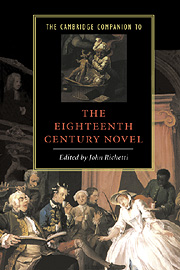Book contents
- Frontmatter
- 1 Introduction
- 2 The novel and social/cultural history
- 3 Defoe as an innovator of fictional form
- 4 Gulliver's Travels and the contracts of fiction
- 5 Samuel Richardson
- 6 Henry Fielding
- 7 Sterne and irregular oratory
- 8 Smollett's Humphry Clinker
- 9 Marginality in Frances Burney's novels
- 10 Women writers and the eighteenth-century novel
- 11 Sentimental novels
- 12 Enlightenment, popular culture, and Gothic fiction
- Index
11 - Sentimental novels
Published online by Cambridge University Press: 28 May 2006
- Frontmatter
- 1 Introduction
- 2 The novel and social/cultural history
- 3 Defoe as an innovator of fictional form
- 4 Gulliver's Travels and the contracts of fiction
- 5 Samuel Richardson
- 6 Henry Fielding
- 7 Sterne and irregular oratory
- 8 Smollett's Humphry Clinker
- 9 Marginality in Frances Burney's novels
- 10 Women writers and the eighteenth-century novel
- 11 Sentimental novels
- 12 Enlightenment, popular culture, and Gothic fiction
- Index
Summary
Perhaps the most surprising fact about the “sentimental novel” of the eighteenth century is that the category is not just the useful invention of literary historians. The declaration “A Sentimental Novel” actually appeared on the title pages of many works of fiction of this period, and was particularly common during the 1770s and 1780s. Yet the novels that advertised themselves in this way are no longer read, even if they might once have been largely responsible for the poor reputation that “sentiment” earned, and for a change in the meaning of the word “sentimental” recorded by the Oxford English Dictionary. At the end of the eighteenth century the use of “sentimental” turned from the approbatory to the pejorative; from “exhibiting refined and elevated feelings” to “addicted to indulgence in superficial emotion.” Yet clearly this change cannot have been certain even by the 1790s, when some novels were still willing to declare themselves “sentimental.”
These novels, prominent in the now buried world of formula fiction of the late eighteenth century, must have been in Jane Austen's mind when she satirized the avid novel reader Sir Edward Denham in Sanditon (1817), the work that she began shortly before her death. “Sir Edward . . . had read more sentimental Novels than agreed with him,” she tells us, and makes him speak with ludicrous enthusiasm of their special qualities:
The Novels which I approve are such as display Human Nature with Grandeur - such as shew her in the Sublimities of intense Feeling - such as exhibit the progress of strong Passion from the first Germ of incipient Susceptibility to the utmost Energies of Reason half-dethroned.
- Type
- Chapter
- Information
- The Cambridge Companion to the Eighteenth-Century Novel , pp. 236 - 254Publisher: Cambridge University PressPrint publication year: 1996
- 10
- Cited by

